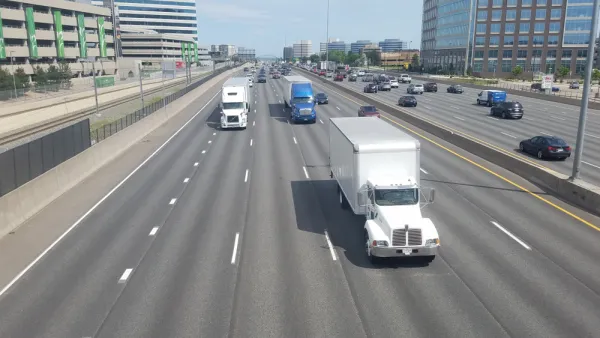The impending bankruptcy of the Highway Trust Fund a lack of clear purpose for national transport investment has Eric Jaffe asking if, after 120 years, we might be witnessing the end of federal transportation funding as we know it.
Jaffe lays out the two opposing arguments for what role the federal government should play in funding transportation.
"On one hand, there are those who believe the country would be better off if federal governance of transportation were either significantly reduced or entirely eliminated." In this scenario, transportation funding responsibility would be shifted to states and localities.
"Proponents of decentralization also point out that, like it or not, the process has already started," notes Jaffe. "This past fall, a number of cities passed referendums to fund local transportation, extending a trend that goes back several years."
On the other side, the arguments for continued federal investment are based on "the historical roots of national transportation investment and the need to coordinate interstate infrastructure."
"It's kind of a myth that it will be feasible for the federal government simply to shed responsibility and leave it to the states," says transport scholar Martin Wachs of the RAND Corporation, a California-based think tank. "There's a national interest in every aspect of the transportation system, and it's a political question as to how to organize it. It's a terrible mistake to think that the best thing to do is just to let it go."
"Of course there's a middle ground to this discussion." adds Jaffe. "The federal government can keep some sort of funding involvement in the nation's roads and rails but see its traditional top-down role of governance reformed."
In the current political climate the prospects for significant reform, whatever form it might take, are slim.
FULL STORY: The End of Federal Transportation Funding as We Know It

Analysis: Cybertruck Fatality Rate Far Exceeds That of Ford Pinto
The Tesla Cybertruck was recalled seven times last year.

National Parks Layoffs Will Cause Communities to Lose Billions
Thousands of essential park workers were laid off this week, just before the busy spring break season.

Retro-silient?: America’s First “Eco-burb,” The Woodlands Turns 50
A master-planned community north of Houston offers lessons on green infrastructure and resilient design, but falls short of its founder’s lofty affordability and walkability goals.

Test News Post 1
This is a summary

Analysis: Cybertruck Fatality Rate Far Exceeds That of Ford Pinto
The Tesla Cybertruck was recalled seven times last year.

Test News Headline 46
Test for the image on the front page.
Urban Design for Planners 1: Software Tools
This six-course series explores essential urban design concepts using open source software and equips planners with the tools they need to participate fully in the urban design process.
Planning for Universal Design
Learn the tools for implementing Universal Design in planning regulations.
EMC Planning Group, Inc.
Planetizen
Planetizen
Mpact (formerly Rail~Volution)
Great Falls Development Authority, Inc.
HUDs Office of Policy Development and Research
NYU Wagner Graduate School of Public Service




























